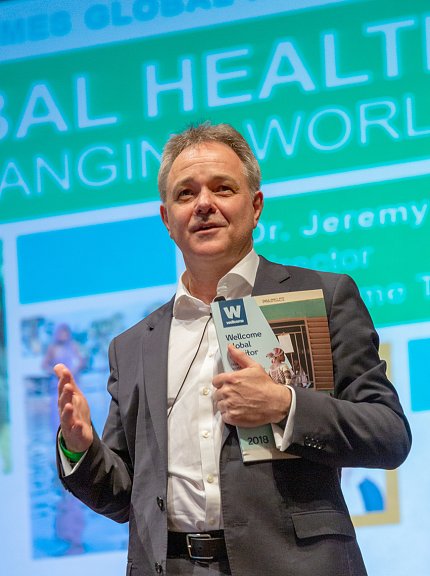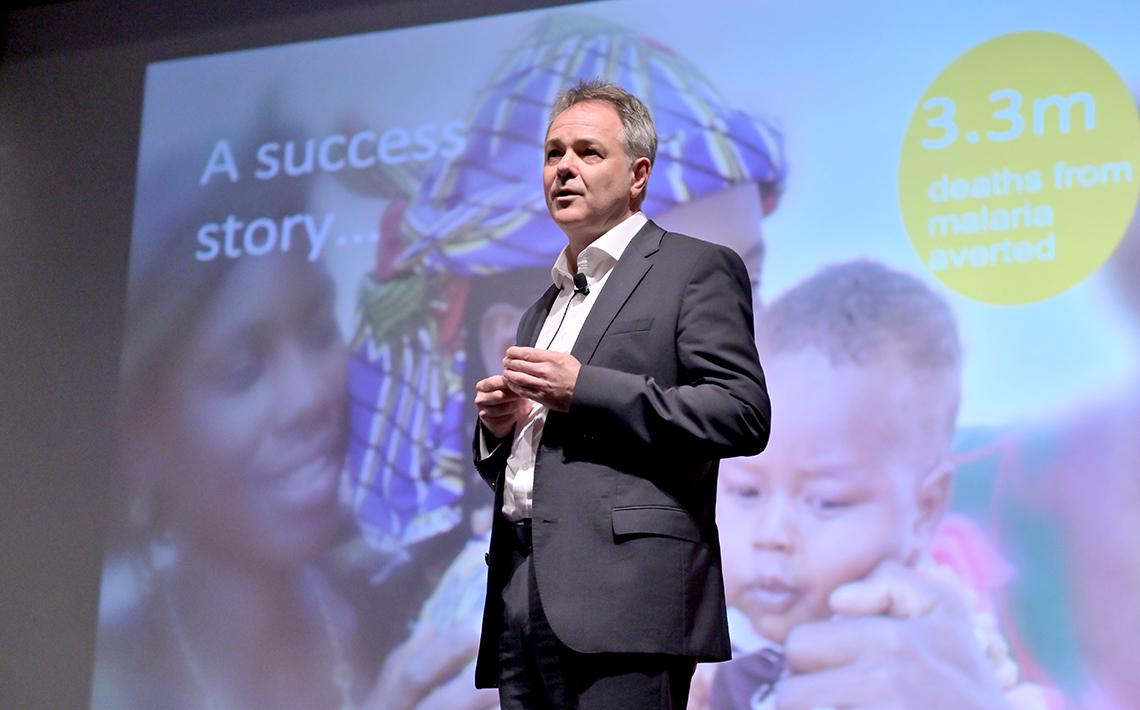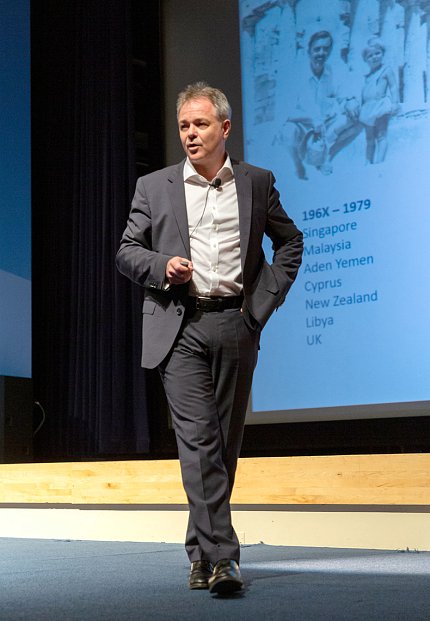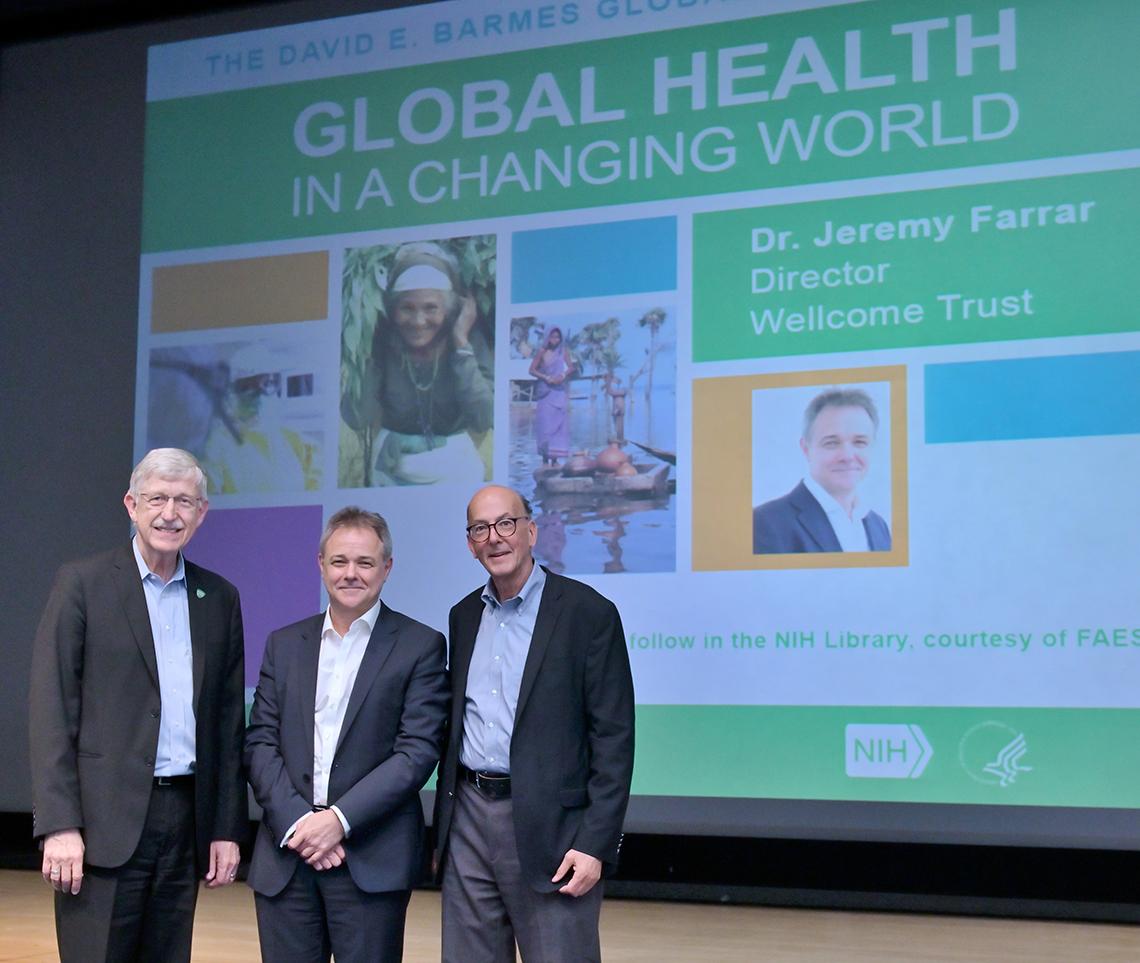Science + Innovation + Society
Farrar Offers 3-Part Prescription for Global Health

Photo: Mena Brunette
The well-being of the world rests atop a three-legged stool, according to Dr. Jeremy Farrar, director of the Wellcome Trust, who also currently chairs the Heads of International Research Organizations. And while two of the legs—science and innovation—are strong and robust, their links to the third critical leg—society—need immediate and constant fortification, or global health could collapse.
“That combination of science, innovation and society is the triangle that Wellcome seeks to put together,” Farrar said recently in Masur Auditorium at the David E. Barmes Global Health Lecture. “Unless we bring those three things together, emotionally and intellectually, and in everything we do, then I don’t think doing any one of those alone will make the transformational changes that are possible and ensure that science and innovation [are] embraced by and accessible to the greatest number of people, wherever they live.”
Lest there be any doubt, Farrar warned in his lecture “Science in a Changing World,” transformational changes are vital now and in coming years to keep pace with incredible research opportunities and shifting political dynamics.
“The truth is, global health has been an absolutely phenomenal success story,” he pointed out. “Over the last few decades, the transformation in people’s lives around the world has been nothing short of remarkable.”
Consider just one example, he said: Between the turn of the century and 2012, 700 million people did not contract malaria, and 3.5 million lives were saved from the disease because biomedical research advances were developed with and for the communities affected.
“Science—bed nets and artemisinin combo therapy—were brought together with communication, with the embracement of society and with true leadership,” Farrar explained.
Citing several other conditions for which prevention or treatment strategies have worked, he said the scientific community nevertheless cannot rest on its laurels but must be more vigilant to see that gains are not lost.
“As these diseases are disappearing from many parts of the world through vaccination and as people lose that personal experience or connection to these diseases, things like the anti-vaccine movement become more powerful,” Farrar said.
His organization recently released its first Wellcome Global Monitor, a survey of 149,000 people in 140 countries about their views on health and science. Findings in the report offer a framework for global health policymaking, Farrar said, but also forecast trouble ahead for cultural thinking.

Photo: Marleen Van Den Neste
“At the very moment when scientific advances are perhaps at their most exciting in decades,” he said, “we are facing a society and a political environment that is questioning the very advances that have been made…The movement questioning the benefits of vaccination is a harbinger of more challenging questions coming from parts of society. As a scientific community, we have been complacent that people would just accept scientific advances and would thank us for them. We’ve got to engage much better than we have in the past.”
He acknowledged anti-vax trends in France, the United Kingdom and the United States, predicting that the “public health impact would be devastating” if vaccination skepticism spread from western nations to countries such as Bangladesh and Rwanda. “We have to see this as one of our great challenges.”
As an example of the damage societal factors can add to a public health crisis, Farrar described the ever-worsening Ebola outbreak in the Democratic Republic of Congo, where science—attributed to NIH and a unique global partnership—has provided a viable vaccine, but the society seems “unwilling to embrace the technological advance…Ebola in an urban setting, with its dense mobile population and complex community interactions and trust in authorities, is a completely different epidemic than in the rural setting of 1976 [when first identified], and that change is what is driving Ebola in the DRC at the moment.”

Photo: Mena Brunette
Farrar sees other concerns—climate change and the environment, urbanization, migration—challenging what he called the “new global health.” Obesity, cancer and non-transmissible diseases and delivery of treatments for chronic diseases and the rapid rise of drug-resistant infections/anti-microbial resistance all weigh heavily on world health care systems. Such issues, he suggested, demand completely different economic models, political mindsets and training of the next-generation medical staff.
There will be “unbelievable changes in society in the next 20 to 30 years in ways we cannot yet predict but will be very disruptive,” he said.
Farrar noted that the travel route between Asia and sub-Saharan Africa is one of the fastest growing in the world currently; a few decades ago, it was nearly non-existent. Increased connectivity opens new routes for potential pandemics, dengue spreading to Africa or yellow fever causing epidemics in Asia for the first time in history.
“At the moment, the double whammy of infectious and non-communicable diseases is putting an enormous strain on many countries’ health systems…Advances in many areas of medicine, immunotherapies for cancers, for instance, have to be made affordable and accessible to the maximum number of people around the world. Otherwise we will face an ever-increasing inequitable world with all the ramifications of that—a huge challenge.”
Wellcome is uniquely untethered, Farrar admitted, describing the organization’s “incredibly privileged” position of having its own endowment, an independent governing board and no shareholders to keep happy. “It comes with a tremendous responsibility to be accountable for what we do and to be as transparent as we can be…[But] in order to achieve the real change we seek, we have to work in partnership with others.”
Farrar reminded the audience that many around the world view NIH as the world’s greatest science institution.
“Coming to work every day at NIH, you might take for granted that your research centers and your clinical care are within the same compound,” he said. “Your clinicians and your scientists go between the two without impediments and intellectually are friends, you share your coffee breaks, lunch, work…That is not normal everywhere.”

Photo: Marleen Van Den Neste
He said he worries about the growing separation between research scientists and clinicians. “For the future development of all our health, medicines, drugs, vaccines and devices, we absolutely need that clinical acumen and clinical insight, partnering with great discovery science,” he declared. “How can we ensure that clinical scientists of the future retain a clinical capacity and are comfortable in the laboratory, and respect the great strengths of both of those?”
In addition to structure and function, Farrar said other qualities of NIH also draw global admiration.
“What you do in the world and what you stand for and the values that you epitomize are the things that the rest of us look up to…It’s a question we must all ask ourselves: If we don’t stand up now for the values we hold dear at this time of real change politically around the world, then when? And if not us, who?
“Don’t forget the leadership role you play, the generosity with which you do that and the huge respect that the world has for this institution and for the American people. Thank you for that leadership, that generosity and respected partnership and never, never step back from it.”
